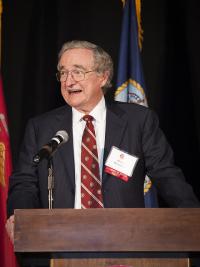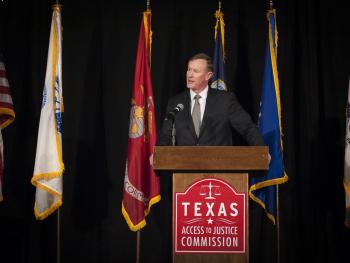The TexasLawbook | By Patricia Baldwin
The sixth annual Champions of Justice Gala Tuesday in Austin raised $401,000 to support legal aid for veterans — for a cumulative total of more than $2 million. Last year, about 8,800 veterans were provided legal assistance. That’s the good news.
The bad news: Texas has nearly 1.7 million veterans, and resources are not sufficient to meet their demand for legal services.
 “Getting aid can make the difference between life and death,” said Harry Reasoner, chair of the Texas Access to Justice Commission. And while he appreciated the response to the gala, the Vinson & Elkins attorney encouraged the state’s lawyers to do more.
“Getting aid can make the difference between life and death,” said Harry Reasoner, chair of the Texas Access to Justice Commission. And while he appreciated the response to the gala, the Vinson & Elkins attorney encouraged the state’s lawyers to do more.
The theme to “do more” and stories of veterans’ needs pervaded the evening of celebration that brought together diverse groups within the legal community, including Supreme Court justices, law school deans, legislators, corporate and law firm attorneys, legal aid practitioners — as well as a former college football coach and a university chancellor.
Keynote speaker William McRaven, chancellor of The University of Texas System and retired U.S. Navy four-star admiral, gave context to the evening’s conversations among the more than 400 attendees.
Borrowing a phrase from a commencement speech he had given, he told the legal gathering he had advised the new graduates about how to change the world: “Start by making your bed.”
That simple act, the chancellor said, is about “order in your life.”
He explained that military personnel are constantly adjusting to situations in war.
“At the end of the day, you return to your plywood hooch, and the only thing you controlled
that day was your bed,” he noted. “There is trouble in the world today.”
Chancellor McRaven choked up as he spoke of “today’s servicemen and women who wear
the flag of the United States and represent all that is good and decent.
“When they come home, all they ask is for a place of safety. All they need is a ‘bed that is
made.’ And that is where you come in.”
He said a veteran’s need for legal services can be as simple as obtaining a power of attorney
document.
The gala represents “one more chance to help,” said legendary Houston attorney Joe Jamail,
known for his philanthropy. “I get more fun from helping than from making money.”
The 89-year-old “King of Torts” was seated at the table in front of the podium and was flanked by former UT football coach Mack Brown and his wife, Sally Brown.
Coach Brown related the story that, before he could officially coach on UT’s Joe Jamail Field, Darrell Royal told him to call the namesake attorney for permission. Approval was obviously conveyed, but Coach Brown noted, with a laugh, “It wasn’t easy.”
Also not easy is getting the word out about the efforts to increase pro bono work, said James Sales, chair emeritus of the Texas Access to Justice Commission and the inspiration behind the gala. On Tuesday, he also received the Commission’s Emily C. Jones Lifetime Achievement Award.
The idea for the gala was two-fold, he said. First, the gala was organized to raise funds for legal aid services. Second, the purpose was to raise the profile for the need for more lawyers to
contribute pro bono work.
“It’s been a struggle,” Sales said, calling the need “astronomical” in size. “There is no higher service a lawyer can perform.”
Harriet Miers, a Texas Access to Justice commissioner and attorney at Locke Lord, agreed with Sales.
She said she welcomed the opportunity to “honor the service people who keep our country free.
We’re here for them.”
Texas Supreme Court Justice Eva Guzman serves as liaison between the court and the commission.
“Too many Texans never get the help they need,” Justice Guzman said.
She told the story of a veteran who, until he received legal assistance, was denied an apartment because of his service dog.
“Legal aid changes lives,” she noted.
Giving back starts early for students at the Texas Tech University School of Law, said Dean Darby Dickerson.
Known as “Dean Darby,” as her nametag reflected, she said her attendance at the gala came in conjunction with a class meeting with students in externships in Austin. In addition to the externship work, they are required to participate in pro bono or community service.
Each semester, she said, she has about 35 students in externships throughout the state. Currently, students are assisting Disability Rights Texas in Austin and Kids in Need of Defense (KIND) in Houston.
The gala also honored attorneys who individually had changed lives. In addition to Mr. Sales, retired Texas Supreme Court Justice Wallace Jefferson received the Emily C. Jones Lifetime Achievement Award for his work toward greater transparency, accessibility and equality in the state’s courts.
Peter Hofer, senior litigation attorney for Disability Rights Texas, received the James B. Sales Boots on the Ground Award for his work on behalf of Texas children with disabilities and chronic health conditions.
Among other things, Mr. Hofer was recognized for spearheading a pro bono initiative that involved training corporate attorneys at Dell Inc. to represent children with disabilities.
“So far, they are undefeated,” Mr. Hofer noted.
Betty Balli Torres, executive director of the Texas Access to Justice Foundation, echoed the evening’s sentiments. She called the gala’s fundraising effort “phenomenal,” but also noted there is work to be done.
“Texas has the second highest population of veterans,” she said. The foundation — the largest Texas-based funder for legal services to the poor — administers funds raised by the gala.
Looking around the crowd, she interpreted the evening’s “story” as an obvious “partnership between the private bar and legal aid.”
She also thanked the gala co-chairs. They included: Linda Addison of Norton Rose Fulbright, Houston; Jack Balagia of Exxon Mobil Corp., Irving; Bob Black of MehaffyWeber, Beaumont; Jerry Clements of Locke Lord, Austin; Joe Jamail of Jamail & Kolius, Houston; and Wayne Watts of AT&T, Inc., Dallas.
Co-chair Bob Black said the gala singled out veterans’ needs as “pressing,” but that the commission has an overall broader mission of promoting public awareness of access to justice issues.
“It’s so important that people have access to the system,” Black said.
And as Joe Jamail pointed out, “There’s no vault where I’m going.”



